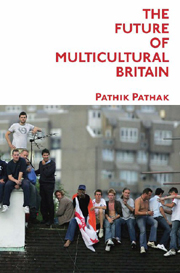Book contents
- Frontmatter
- Contents
- Acknowledgements
- Glossary of Indian Terms
- Introduction
- 1 The Trouble with David Goodhart's Britain: Liberalism's Slide towards Majoritarianism
- 2 Saffron Semantics: The Struggle to Define Hindu Nationalism
- 3 Spilling the Clear Red Water: How we Got from New Times to New Liberalism
- 4 The Blame Game: Recriminations from the Indian Left
- 5 Making a Case for Multiculture: From the ‘Politics of Piety’ to the Politics of the Secular?
- Conclusion
- Index
4 - The Blame Game: Recriminations from the Indian Left
Published online by Cambridge University Press: 12 September 2012
- Frontmatter
- Contents
- Acknowledgements
- Glossary of Indian Terms
- Introduction
- 1 The Trouble with David Goodhart's Britain: Liberalism's Slide towards Majoritarianism
- 2 Saffron Semantics: The Struggle to Define Hindu Nationalism
- 3 Spilling the Clear Red Water: How we Got from New Times to New Liberalism
- 4 The Blame Game: Recriminations from the Indian Left
- 5 Making a Case for Multiculture: From the ‘Politics of Piety’ to the Politics of the Secular?
- Conclusion
- Index
Summary
In the colonial society, community was where citizenship was not.
The jeering, hooting young men who battered down the Babri Masjid are the same ones whose pictures appeared in the papers in the days that followed the nuclear tests. They were on the streets, celebrating India's nuclear bomb and simultaneously ‘condemning Western Culture’ by emptying crates of Coke and Pepsi into public drains. I'm a little baffled by their logic: Coke is Western Culture, but the nuclear bomb is an old Indian tradition?
In the years following the BJP's ascension to power at the centre, a flurry of critiques claiming to expose the intellectual rationale for Hindu nationalism has appeared. From the philosophy of Chetan Bhatt's Liberation and Purity (1997) and the rationalism of Meera Nanda's Breaking the Spell of Dharma (2003) to the varied Marxisms of Achin Vanaik's The Furies of Indian Communalism (1997) and Radhika Desai's Slouching Toward Ayodhya (2002), they have commonly indicted the follies of Indian anti-secularism for ‘sharing discursive space’ with Hindutva.
It is no doubt true that the ascendancy of the postcolonial critique of modernity assigns it a powerful voice in debates around the legitimacy of state secularism in India. Since it has long since concerned itself with posing a political as well as an epistemological challenge to Western power, postcolonial reason has led in the front lines of a battle of ideological wills which has split India's contemporary Left.
Nanda, for example, writes that postcolonial studies aided and abetted the meteoric coming to hegemony of cultural nationalism and the cultivation of the religious vote bank.
- Type
- Chapter
- Information
- The Future of Multicultural BritainConfronting the Progressive Dilemma, pp. 122 - 157Publisher: Edinburgh University PressPrint publication year: 2008



